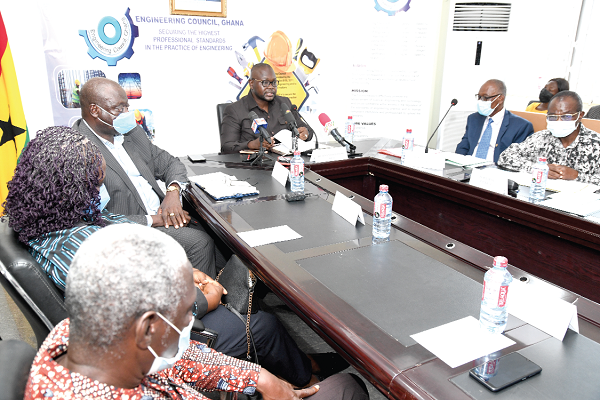
Unlicensed engineering practitioners to be sanctioned
Practitioners and firms who provide engineering services without the requisite licences will be sanctioned, effective November 1, 2021.
In accordance with the Engineering Council Act 2011 (Act 819), all engineering professionals and firms offering engineering related services are to register and obtain licences from the Engineering Council Ghana before they can operate legally in the country.
This was announced at a press conference by the Ministry of Works and Housing in Accra yesterday.
It highlighted the Engineering Council Act 2011 (Act 819) and the Engineering Council Regulation 2020, Legislative Instrument (LI) 2410, which seek to ensure adherence to highest standards in the industry.
Under the act, which came into force in October 2020, practitioners and firms have a grace period of 12 months after the promulgation of the law to register and obtain licences.
Advertisement
The end of October 2021 is the deadline.
Year of Action
The Chairman of the Engineering Council Board, Mr Kwesi Abbey Sam, said the council had declared 2021 a year of action and would, therefore, embark on a major exercise to clamp down on unlicensed engineering practitioners to ensure sanity in the sector.
He advised those who dealt in engineering services, including firms, to engage the services of only registered practitioners, contractors, consultants and vendors of engineering equipment and components.
To fulfil the requirement of Act 819 and LI 2410, Mr Sam said, the council had licensed the Ghana Institution of Engineering (GhIE) and the Institution of Engineering and Technology, Ghana (IET-GH) to process the registration of all categories of engineering practitioners, firms and educational units in the country.
Application of sanctions
A member of the Legal and Ethics Committee of the Engineering Council Board, Mr Ebenezer Haizel, said persons and organisations which contravened the law would face sanctions, including fines, imprisonment or both.
He also said any person who failed to register with the council could not practise or profess as an engineering practitioner.
"Anyone who contravenes the provisions of the act commits an offence and is liable, upon summary conviction, to a fine of not more than 5,000 penalty units or a term of imprisonment of not more than two years or to both," he said.
A penalty unit is GH¢12.
Foreign engineers who want to undertake any project or work either short or long term are also required to register with the council.
Mr Haizel further explained that the Engineering Council Act, 2011 (Act 819) aimed to effectively promote science, engineering and technology advancement and create confidence within society through the regulation of standards of practice, including the licensing of institutions and professionals.
“Engineering Council Regulation 2020 (LI 2410), on the other hand, is to regulate the practice of engineering and provide for regulated matters to ensure high professional standards in the practice of engineering.
“LI 2410 will also help the Engineering Council Act to ward off quack engineering schools and practitioners,” Mr Haizel added.
Significance
The Minister of Works and Housing, Mr Francis Asenso-Boakye, said engineering played a major role in the development of the nation.
Ghana, he said, had witnessed a number of engineering challenges in the past, including examples of roads and bridges which did not live up to standard, inadequate hydraulic structures on water courses resulting in floods and structural failure of buildings, resulting in loss of lives.
He expressed the hope that engineering practitioners would work to ensure high professional standards in accordance with the Engineering Council Act and LI 2410.
"Engineering failures could cause disasters, resulting in unimaginable damage. Engineering practitioners should not only be concerned with economic gains or prestige but also strive to respect human life," the minister added.
He commended the GhIE for securing support from BUSAC funds to help the Engineering Council draft the Engineering Regulation LI 2410, 2020, which was approved by Parliament.
